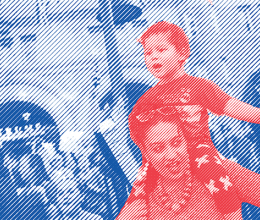“Judges and prosecutors have more power than the president, if you ask me,” Qiana Johnson told people gathered at Courtwatch DC’s public launch event in July. “As I was going through the criminal legal system, I realized that it had nothing to do with right or wrong, just or unjust. I thought, ‘People are not going to believe what I’m going through. I have to let people see this for themselves.’”
Founded and led by formerly incarcerated Black women and powered by Black abolitionist group Harriet’s Wildest Dreams, Courtwatch DC is a community-based mutual aid program that trains people to observe, document, and address injustice in local courts. Court watchers see the courts’ injustice for themselves and aim to hold judicial actors accountable while supporting people navigating the criminal legal system.
This kind of vigilance and support is critical. Decisions by prosecutors have contributed to D.C.’s high incarceration rate, that substantially exceeds the rate in peer cities such as San Francisco and New York City. Black people bear the brunt of this punitiveness, making up nearly 90% of D.C.’s incarcerated population while comprising only 47% of the District’s population. Yet, despite their vast power, prosecutors and judges face little to no accountability. Courtwatch DC aims to change that dynamic, and we have already made significant strides in our first year.
Here are 3 ways that our growing community of court watchers challenged injustice in 2022.
1. We trained more than 100 people to watch the courts every week.
At Courtwatch DC’s biweekly training sessions, volunteers learn how D.C. courts work, what to watch for, and how to document what’s happening to ensure that our work is accurate and impactful. The training sessions are open and accessible to all community members, regardless of experience with the court system.
More than 100 trained community members have watched the courts weekly on Saturdays throughout 2022 and on Mondays since the summer. Court watchers have monitored the behavior of key players like judges, prosecutors, and defense attorneys in nearly 1,000 cases.
2. We built a community of support for loved ones facing charges.
We call community members facing charges “loved ones” to restore the humanity that the criminal legal system so often strips from our friends, families, and neighbors. In addition to holding judicial actors accountable, we watch the courts so that we can intervene and support loved ones throughout the process.
In the Participatory Defense meetings that Courtwatch DC facilitates, people who have faced incarceration and those who are familiar with the criminal legal process guide loved ones who are currently facing charges and identify ways we can prevent incarceration and harm. We have also partnered with DC IWOC (Incarcerated Workers Organizing Committee) to provide materials and information to loved ones leaving the D.C. Jail. With community support, loved ones have beaten their charges, secured gainful employment and stable housing, and even voted for the first time.
3. We tracked patterns of injustice across nearly 1,000 cases.
Every week, court watchers document the broad array of injustices in District courtrooms. For example, we watched an attorney ask a judge to schedule their client’s hearing on a date that would allow that person to attend their first day of work. Instead of accommodating this modest request, the judge scheduled the hearing on the exact date of the loved one’s first day at a new job.
Our initial data suggest that judges and prosecutors are not taking a whole-person approach to initial hearings. In more than 90% of the nearly 1,000 cases we’ve documented, whether the loved one has family or employment is never mentioned. Instead, at these initial hearings, judges quickly decide whether to put a person behind bars until their next hearing without considering the human toll on individuals and families. But how can they fairly make that determination if they don’t ask about the loved one’s community ties?
The injustices we’ve seen also extend to court officers. For example, on the morning of July 29, 2022, during pretrial proceedings in Courtroom C-10 before Judge Sherry Trafford, an officer standing outside the courtroom door stopped court watchers from entering the courtroom for no discernible reason. The officer also denied entry to an attorney at the time of his client’s arraignment. Because the attorney was blocked from the courtroom, he could not explain to the judge why his client was unable to come to court that day; the judge almost issued a bench warrant as a result. To start the accountability process for such injustices, we recently sent a letter to Chief Judge Anita M. Josey-Herring of the Superior Court of the District of Columbia. In it, we detailed these incidents and other ways community members have been denied our constitutional right to watch the courts.
There are many ways to get involved with Courtwatch DC, from watching court proceedings to acting on the information we collect. Learn more and connect with our growing community at CourtwatchDC.org

